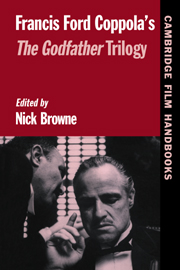Book contents
- Frontmatter
- Contents
- Acknowledgments
- List of Contributors
- Francis Ford Coppola's Godfather Trilogy
- Fearful A-Symmetries
- 1 If History Has Taught Us Anything … Francis Coppola, Paramount Studios, and The Godfather Parts I, II, and III
- 2 The Godfather and the Mythology of Mafia
- 3 The Representation of Ethnicity in The Godfather
- 4 Ideology and Genre in the Godfather Films
- 5 Family Ceremonies: or, Opera in The Godfather Trilogy
- Filmography
- Reviews of the “Godfather” Trilogy
- Select Bibliography
- Index
2 - The Godfather and the Mythology of Mafia
Published online by Cambridge University Press: 05 June 2012
- Frontmatter
- Contents
- Acknowledgments
- List of Contributors
- Francis Ford Coppola's Godfather Trilogy
- Fearful A-Symmetries
- 1 If History Has Taught Us Anything … Francis Coppola, Paramount Studios, and The Godfather Parts I, II, and III
- 2 The Godfather and the Mythology of Mafia
- 3 The Representation of Ethnicity in The Godfather
- 4 Ideology and Genre in the Godfather Films
- 5 Family Ceremonies: or, Opera in The Godfather Trilogy
- Filmography
- Reviews of the “Godfather” Trilogy
- Select Bibliography
- Index
Summary
What we call Mafia is a most peculiar organization. It is a secret society that is, in fact, so secret that it denies its own existence. The traditional code of the mafioso (which has been broken by many in the last decade, as is discussed later) prescribes that once arrested, one should deny any association with or knowledge of the organization, to the extent of dismissing the very notion of Mafia as “a myth.” However, the Mafia is also a powerful apparatus of symbolic production, deeply concerned with its own appearance. The language, the rituals, the means of communication to the enemy, the overarching value system are well thought out and handed down among the mafiosi with particular pride and care. In other words, the “myth” is not left to the imagination of the media and the public; on the contrary, it is created, preserved, and presented by the Mafia itself. Like a religious sect rather than a political movement or a straightforward criminal enterprise, the Mafia has defined its own identity in terms of myth; it has “chosen” and endeavored to become a myth.
The Godfather is the broadest representation of this myth in our days; it made it into a popular culture staple with worldwide appeal. What I am concerned with here is the process by which a self-generated, culturally specific myth is translated into the language of popular culture and made into a hugely successful product.
- Type
- Chapter
- Information
- Francis Ford Coppola's The Godfather Trilogy , pp. 57 - 75Publisher: Cambridge University PressPrint publication year: 1999
- 1
- Cited by

